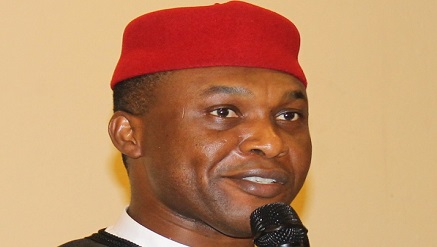General News
Chidoka’s (Aviation) Stimulus Plan

Last week, Nigeria’s Minister of Aviation, Mr Osita Chidoka was in London. It was an opportunity for him to impress the international community with his plans to grow the budding, but fast-paced Nigerian aviation industry.
The venue was the famous Chatham House, where Chidoka told his audience that what the country’s aviation industry needed was an “economic stimulus” plan to get out of the wood.
It was a special moment and everyone listened with rapt attention — an almost magical moment that lit up the hall.
Really, for several years, the country’s policymakers have waffled over such an idea, while the Nigerian airlines continue to flounder.
Now, the minister has put back the thorny issue of financing the industry on the front burner. “That is just exactly what the industry needs”, he said. “By introducing some initiatives, we are beginning to feel the pulse of the industry.”
Taking a comparative approach to justify the need for his plan, Chidoka said that several thriving airlines around the world have typically enjoyed or continue to enjoy government financial and material support.
According to him, among them are three US airlines—Delta Airlines, American Airlines and United Airlines – which have received over $40 billion in US government subsidies in the past decade.
Thus, the Nigerian aviation leader unfolded the key components of his novel idea to include economic stimulus plan and a strategic framework for the growth of the industry.
According to him, the stimulus plan “would involve a package of financial incentives that will provide support across the aviation value chain.”
Mr Chidoka impressed his audience with the idea of a Nigerian aviation industry growth plan, which everyone in the audience gave support to as clear-cut vision being driven by a clear-headed person.
The focus areas as identified by the minister were: airline operation and safety, aerodrome infrastructure and operation, airspace management, aviation allied services and manpower development.
It was clear from his analysis that the country’s aviation industry was underperforming in terms of its contribution to the country’s Gross Domestic Product, Chidoka said.
At a current GDP of N80.3 trillion or $509.9 billion, Nigeria’s aviation industry contributes a paltry $0.7 billion, which in percentage terms, is less than one per cent, about 0.4 per cent of GDP. Comparatively, the aviation industry contributes 27 per cent to Dubai (UAE)’s GDP and 2.1 per cent to the South African economy.
The minister attributed this dismal performance to current “gaps” in the system which, he said have hampered growth in the sector.
These gaps include: “underfinanced domestic airlines, underutilised BASA (bilateral Air Service Agreements), poor incentives for private sector participation and weak corporate governance in the industry.
Clearly, Mr Chidoka is leaving no one in doubt as to the direction of things in his ministry.
The new strategies, the Nigerian Aviation Industry Strategy Framework and the Economic Stimulus Plan (ESP) will ensure he achieves his plan.
Whereas, the ESP may form a key part of a broader Industry Strategy Framework, these may actually be complementary.
The ESP will target the funding problems of domestic airlines with the mission to ameliorate them.
This focuses boldly on confronting the financial challenges that have dogged domestic airlines.
To be sure, the Jonathan administration remains irrevocably committed to completing the physical and structural transformation of the country’s airports by carrying through with the airport remodelling /rehabilitation programme and the building of five new state-of-the-art international airport terminals in the country—which have reached advanced stages.
Last year, at several public meetings which the Aviation Minister held with industry stakeholders, especially domestic airline operators, service providers and trade unions —he had promised to take into consideration their advice while drawing up a policy framework to move the industry forward.
Thus, it is believed that the new Aviation Industry Strategy Framework proposed by the minister as the new springboard to advance the industry incorporates the interest of key aviation stakeholders.
Chidoka also wants to work more with the private sector as a key partner to achieve a majority of the goals and targets he has set for the country’s aviation industry.
Nonetheless, Chidoka had made it clear several months ago when he assumed his position that he intends to continue with the aviation transformation agenda left behind by his predecessor.
Yet, like a chessboard grandmaster, Chidoka has been tinkering with his ideas, hoping to find a perfect fit between the past and the present.
Though, the Aviation Transformation, which Chidoka had vowed to continue with, provides a broad set of goals and objectives for the industry, the minister’s newly fangled Nigerian aviation Industry Strategic Framework may provide the flight plan that will confront present challenges.
Chidoka’s ESP would not be the first in the industry. A plan of such nature under the Olusegun Obasanjo administration led to the N17billion aviation intervention fund.
Sadly, the fund crash-landed, failing to achieve its goal of ameliorating the funding problem of the industry. Chidoka is convinced he should take another shot at fixing the problem.
The minister armed with proof of similar actions taken by western countries to assist their own airlines appears determined to convince Nigerians that this is the right flight plan.
On March 3, inside Chatham House in London, Chidoka gave convincing argument, providing data that showed that several airlines in the US,UAE, Europe and elsewhere in the world routinely receive financial assistance from their various governments.
This support, as he pointed out, remains critical in not only keeping these airlines afloat but in ensuring that they flourish.
The minister also unfolded an “action plan” which he argued would help to “achieve business growth” in the country’s aviation industry.
These are: Stimulate increased foreign direct investment in the sector; reduce industry risk and expand credit and aviation finance, tailored to industry requirements; stimulate equity investments through attractive and competitive incentives across the aviation value chain.
Others are: facilitate government intervention and guarantees to boost industry performance and stimulate and facilitate local direct investment in sector.
The second stage of the action plan that would build on the success of the first one, according to Chidoka, will include the – creation of a robust regional hub and aviation city model that drives commercial; improve corporate governance and enterprise risk of industry operators; liberalise air space by implementing the Yamaussoukro Declaration; review government intervention model and move to commercial funding.
Another area of focus that is dear to the minister’s heart is safety and passenger comfort. When he paid an unscheduled visit to inspect ongoing rehabilitation work at the Nnamdi Azikiwe International Airport in Abuja last year, Chidoka said the focus on security and safety was to ensure that the country retained its Category One air safety certification. Happily, this valuable recertification by the US FAA was achieved last year.
To check the “low level corruption” in the aviation industry, especially the airports across the country, the minister signed an MOU with the ICPC and directed FAAN, to partner the Economic and Financial Crime Commission, EFCC, to check malpractices and enhance the delivery of efficient services.
A few months ago, the minister inaugurated the first e-portal for the Nigerian Aviation Ministry and its agencies through which Nigerians and foreigners alike can interact with aviation officials including with his own office.
Through the e-portal, complaints can be sent directly to the minister. This cuts through bureaucratic red tape.
This communication channel, Chidoka hopes would improve the level of service delivery and customer satisfaction at our airports.
The minister has also signed up with the Independent Corrupt Practices Commission, ICPC in order to improve corporate governance at the aviation agencies which interface with the public.
The launching of the Aviation Passenger Services Portal, APS, on December 6, 2014 and the Aviation Commits Initiative (ACI) on 3rd February 2015, passengers have been able to keep the airlines on their toes by promptly reporting any erring airline for appropriate sanctions.
This initiative has in no small way assisted passengers to be the “centre” of the concern of all aviation stakeholders.
Passengers are protected under the new Advocacy and enforcement of Customers Bill of Rights Policy initiatives.
This Customers Bill of Rights Policy has further been strengthened by Chidoka with his introduction of Key Performance Indicators (KPI) for monitoring, evaluating and improving performance of aviation workers.
He also launched a sector- wide initiative Aviation Commits where all stakeholders in the industry commit to improve service delivery to the public.
Aviation parastatals, service providers and stakeholders were made to publicly commit to render prompt and reliable services to the public.
To check the “low level corruption” in the aviation industry, especially the airports across the country, the minister signed an MOU with the ICPC and directed FAAN, to partner the Economic and Financial Crime Commission, EFCC, to check malpractices and enhance the delivery of efficient services.
Only last week, the Minister directed the immediate implementation of the Aviation Revenue Automation Project (ARAP) project within 60 days to plug leakages towards making the sector more competitive.
Chidoka also provided insight into the direction of the country’s aviation industry.
“As we gradually transit into a new era of aviation business, this government is ready to make sure that those turning the wheels of the industry, do so with ease,” he explained.
“At the end, we want to build an economic engine that offers a decent ROI to everyone who has a stake in the industry. We invite the private sector to take the cockpit while government clears you for takeoff,” the minister said extending invitation to private investors.
Yakubu Dati is general managers, Corporate Affairs at FAAN
General News
FG Announces New Fossil Fuel Tax

Federal government has announced it will impose a new 5 percent refined fossil fuel tax from January.

The surcharge, which has been signed into law by President Bola Tinubu to encourage clean energy use, could raise more than half a billion dollars annually.
The fee will apply to petrol and diesel, while cooking gas and compressed natural gas — which the government has tried to promote — are exempted.
Nonprofit group ActionAid Nigeria said the policy will “disproportionately impact the poor” and deepen inequality, noting that Nigerians have not recovered from the inflationary effect of the removal of fuel subsidies in 2023.
General News
FintechNGR Announces DevTribe 2025, Focuses on Empowering Nigeria’s Software Developer Ecosystem

The Fintech Association of Nigeria (FintechNGR) has announced DevTribe 2025, its flagship software developer-focused conference, set to hold on Saturday, August 23, 2025, at The Zone, Gbagada, Lagos.

With the theme “Trends, Tools & Tech Stacks for Modern Developers,” the conference aims to convene Nigeria’s growing community of software developers, tech professionals, founders, and ecosystem enablers for a day of technical exchange, innovation, and collaboration.
DevTribe 2025 is part of FintechNGR’s broader strategy to strengthen the software development pipeline in Nigeria and bridge critical gaps in mentorship, tooling, and visibility for local tech talent. This year’s event promises an immersive and community-driven experience, with a strong emphasis on emerging technologies, practical skills, and inclusive opportunities for developers at all levels.
“The DevTribe platform reflects our commitment to supporting the people building Nigeria’s digital future not just by acknowledging their role, but by actively investing in their growth,” said the organisers. “We’re bringing the right people, tools, and ideas into one room to shape the next phase of innovation.”
The event will feature keynote addresses, lightning talks, community-led sessions, and a career fair designed to help software developers connect with hiring partners and growth opportunities. It also offers a space for collaboration among startups, corporates, regulators, and talent platforms working to drive inclusive digital transformation.
FintechNGR welcomes software developers, companies, and ecosystem partners to be a part of DevTribe 2025.
General News
NBA Africa Urges Entrepreneurs to Apply for Funding

NBA Africa, the local affiliate of the NBA basketball brand in the US, has announced the second edition of Triple-Double: NBA Africa Start-up Accelerator, which aims to promote the continent’s technology ecosystem and the next generation of entrepreneurs.

The NBA Africa Startup Accelerator will strengthen Africa’s technology ecosystem by providing mentorship and investment to the next generation of African tech entrepreneurs.
The organisation announced the initiative would once again be administered by ALX Ventures, a technological incubator that equips the continent’s innovators in technology with the knowledge and tools they need to develop and scale their enterprises.
Furthermore, NBA Africa named ServiceNow, an AI platform for business transformation whose Now Assist and AI agents help organisations in delivering ‘faster and smarter experiences’ at scale, as an official program partner.
The organisation stated that startups can apply to participate at tripledoubleaccelerator.nba.com until Friday, August 29, following which the applications will be filtered down to a top 10 list.
The shortlisted startups will then participate in a 10-week mentorship program, where they will be paired with mentors from NBA Africa, ServiceNow, and ALX leadership, as well as other corporate stakeholders, who will advise the companies on product development, business growth, and go-to-market strategy.
The finalists will next present their technologies to international industry professionals at the program’s second Demo Day in December, when the top five prize-winning companies will be chosen to receive financial assistance and mentorship.
“Last year’s inaugural Triple-Double Accelerator program showed how much talent, passion and creativity there is among African entrepreneurs who are shaping the future of the continent’s rapidly growing sport and entertainment industries,” said NBA Africa CEO Clare Akamanzi. “We look forward to reviewing this year’s submissions and to helping another round of promising startups take the next step in their development.”
Last year, almost 700 early-stage African entrepreneurs applied to the program.
Ten finalists were then chosen to pitch their products to a panel of international industry leaders at the program’s first Demo Day, which took place at the NBA headquarters in New York City.
Four prize-winning companies – Festival Coins (Nigeria), Salubata (Nigeria), HustleSasa (Kenya), and UBR VR (Egypt) – were awarded financial support and mentorship.

 Telecom3 days ago
Telecom3 days agoNCC to Sanction Operators over Regulatory Violations

 General News3 days ago
General News3 days agoCustoms Ditches Fast Track Scheme for Authorised Economic Operator

 News3 days ago
News3 days agoFG to Move 5m Homes to Clean Cooking by 2030 — Minister

 Telecom3 days ago
Telecom3 days agoAirtel Africa Signs Multi-year Strategic Partnership with Xtelify

 E-Business2 days ago
E-Business2 days agoReport Reveals Over Half of Security Experts Overwhelmed Managing Cybersecurity Tools from Multiple Vendors

 E-Financial3 days ago
E-Financial3 days agoSEC DG Warns as Crypto Adoption Rises in West Africa Without Proper Regulations

 E-Financial3 days ago
E-Financial3 days agoNOVA Bank Deepens Market Presence with New Branches and Regional Focus

 Telecom2 days ago
Telecom2 days agoMTN & Ultima Studios Kick Off Hunt for Nigeria’s Next Afrobeats Icon



























